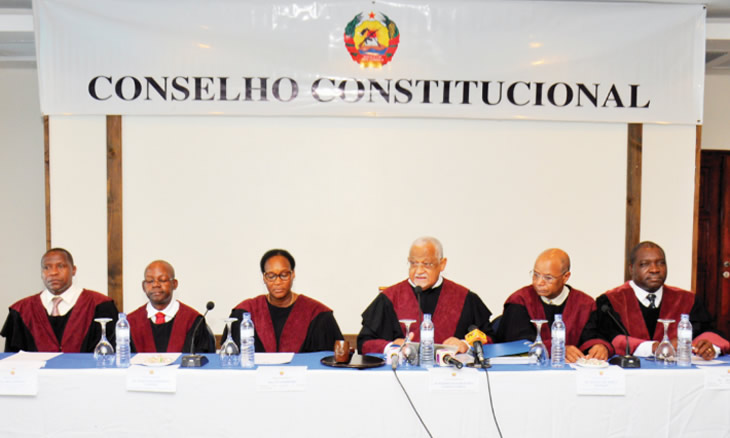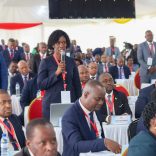Mozambique: Delay in approving Mondlane's party result of "many processes" with similar requests
Constitutional Council rejects more Renamo appeals – Mozambique Elections, AIM report

In all cases, the Constitutional Council rejected the appeals because they did not obey the principle of “prior objection”. File photo: O País
The Constitutional Council, Mozambique’s highest body in matters of constitutional and electoral law, has rejected six appeals by the two opposition parties, the former rebel movement Renamo, and the Mozambique Democratic Movement (MDM), against the announced results of the municipal elections held on 10 October.
In all cases, the Council rejected the appeals because they did not obey the principle of “prior objection” – this is a clause in the election law which says that appeals can only be considered, if a complaint is made at the place where the irregularity or fraud allegedly took place. In some cases, the appeals were also delivered past the legal deadline.
“Prior objection” means that, if a party believes that fraud took place at a particular polling station, it must denounce it at this station. The law states that the polling station chairperson must register any such complaint. If the party is protesting against the results declared at the “intermediate count” held by a district or city elections commission, it must first raise its objection with the commission. Only then will its appeal be considered by district courts and, eventually, by the Constitutional Council.
In all the cases considered by the Council, and which have now appeared on its website, district courts threw the appeals out, and the Council found they were right to do so. Because Renamo and the MDM delivered their appeals past the legal deadline, or did not observe the principle of prior objection, the Council could not consider the points of substance raised by the two parties.
And some of these are very serious. Thus in the mining town of Moatize, in the western province of Tete, Renamo said that its copies of the polling station results sheets show that Renamo won the election here. At about 03.00 on the day after the election, the director and head of operations of the Electoral Administration Technical Secretariat were caught falsifying the results at one polling station.
Despite this, according to Renamo, the polling station results sheets showed Renamo had won 11,169 votes against 9,856 for Frelimo and 546 for the MDM.
But on 12 October, the STAE director and all the election officials appointed by Frelimo did not show up to complete the “intermediate count”. The following day the Frelimo-appointed official broke into the local STAE warehouse, and falsified the results sheets.
On 14 October a new result was announced granting victory to Frelimo by a margin of 9,839 votes to 9,743 for Renamo and 565 for the MDM. Renamo said it could not contest this second “intermediate count” because it was done in secret, and the Renamo-appointed members of the electoral bodies were not invited.
The Moatize district court did not contest Renamo’s accusations, but refused to consider them on the grounds that there had been no “prior objection”. The court did not accept the argument that Renamo could not protest against a count it knew nothing about, and argued that, as soon as the results of the intermediate count were posted at the headquarters of the district elections commission, Renamo should have complained.
The Constitutional Council agreed – there was no sign of any Renamo protest before it took the matter to the district court, and since the principle of “prior objection” was fundamental to the electoral law, the Council could not consider the Renamo allegations.
The public knows that the Renamo allegations are essentially true, thanks to the work of journalist Aparicio Jose de Nascimento, editor of the weekly paper “Malacha”, published in Moatize, who collected all the information from the results sheets of the 49 Moatize polling stations and published it.
The Moatize polling station results, as given by “Malacha” showed Renamo winning 11,166 votes to 9,789 for Frelimo – almost exactly the same as in the first district count.
The irregularities in the town of Marromeu, in the central province of Sofala, were just as flagrant. Renamo said the “intermediate count” announced by the Marromeu district elections commission contradicted the copies of the polling station results sheets in Renamo’s possession.
There were clashes at the Marromeu polling stations, the police opened fire, and four people were injured. Renamo claims that a STAE representative said the tense atmosphere made it impossible to accept complaints from political party monitors, or to deliver copies of results sheets to the parties. In the confusion, several polling station results sheets and minutes were allegedly falsified, turning a Renamo victory into a Frelimo one.
The district court admitted that serious irregularities had occurred, including a unilateral STAE decision to collect polling station results sheets and minutes before they had been signed or made public. When the political party representative went to the STAE offices to sign the results sheets, they found they were not there and did not arrive until four hours later.
The Constitutional Council admitted that these accusations were serious and, if true, compromised the elections in the entire municipality. Nonetheless there was no sign of any Renamo protest at any of the polling stations, and so the Council agreed with the court’s decision to reject the appeal for lack of “prior objection”.
In the city of Matola, not only was there no “prior objection” by Renamo to the count done by the City Elections Commission, but the Renamo appeal was late. The Matola “intermediate count” was announced at 09.15 on 13 October in the Matola Municipal Auditorium. Renamo had 48 hours to appeal – i.e. until 09.15 on 15 October – but did not do so until 16 October. That day’s delay was sufficient for the Renamo appeal to be thrown out without analysing its claims.
The Constitutional Council pointed out that deadlines in the electoral law “are substantive, and they are counted continually, hour by hour, minute by minute, given the urgency in processing electoral acts”.
Renamo had protested at fake results sheets. Three results sheets, supposedly from the intermediate count by the City Commission, have appeared, and two of them must be forgeries. The council had already ordered copies of these sheets to be sent to the Public Prosecutor’s Office, which must look into their authenticity, or lack of it, and where they came from.
Renamo also alleged a series of irregularities in the northern city of Lichinga and at two polling stations in the central town of Nhamayabue, and in both cases the Council supported the courts’ decisions to reject them because here had been no prior objection at any of the polling stations.
The MDM appealed against the result in the central city of Beira – even though it won in this municipality. Its complaint was that the number of invalid votes had allegedly been falsified, which could have affected the distribution of seats in the municipal assembly.
But the MDM appeal was made a day later than the 48 hour deadline, and there was no sign of any MDM prior objection at any of the polling stations.
The failure to make “prior objections” and to meet deadlines is what has doomed opposition appeals in previous elections. Renamo and the MDM have only themselves to blame since the deadlines and the concept of prior objection are in the electoral laws, which were approved unanimously by the Mozambican parliament, the Assembly of the Republic, including by its Renamo and MDM members.
Despite the failure of the Renamo appeals, the Constitutional Council could still refuse to validate the obviously compromised results from Marromeu and Moatize. There is a precedent for this – the Council, on its own initiative, rejected the results from Gurue in Zambezia province in 2013, and ordered new elections in this municipality, which were then won by the MDM.












Leave a Reply
Be the First to Comment!
You must be logged in to post a comment.
You must be logged in to post a comment.